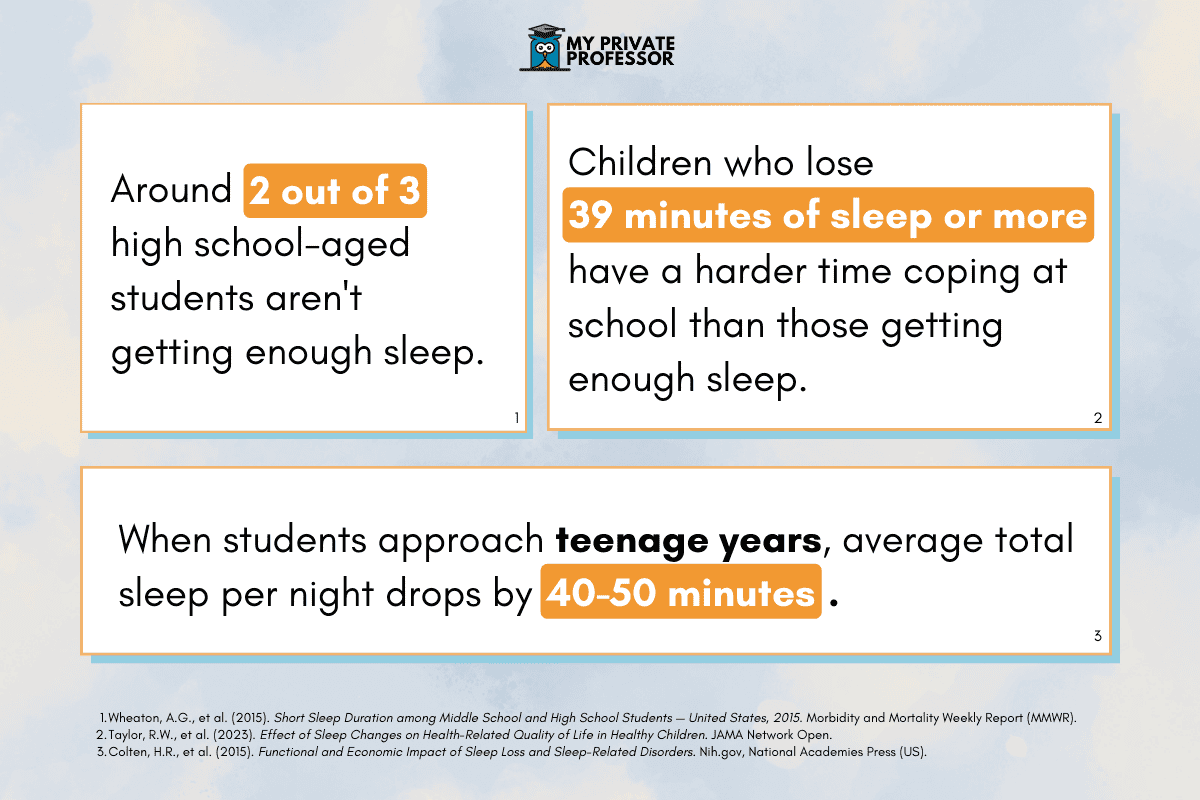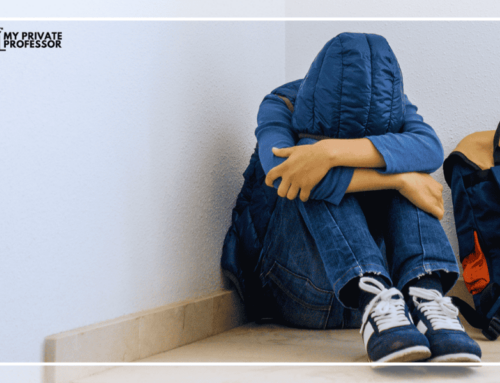Sleep is to students what yeast is to bread.
Students spend the school day chugging along, working their brain muscles endlessly until the bell rings, letting them know they can finally slow their gears. That is, until they get home and have to hunker down at their desk to complete what feels like a million assignments.
How do they continue to rise, day after day? Of course, with a lot of patience, hard work, and focus. But without one key ingredient, they’d flounder and flail. That key ingredient is sleep.
Sleep is like the equivalent of your iPhone charging overnight. When it’s morning, the phone is ready to go, full of juice. But when you don’t charge it, it won’t be functioning at its highest, because it has less energy to work with.
Similarly, when students don’t get enough sleep, they often don’t have enough energy to power through a high-functioning school day.
Sometimes, it seems like the only way to get everything done is by pulling that dreaded all-nighter. But in the long-run, this can actually end up being counterintuitive because of how sleep deprivation affects cognitive functioning.
In fact, research shows that sleep deprivation can cause cognitive impairment, difficulty multitasking, and decreased alertness.
How does poor sleep affect academic performance?
Evidently, good sleep is one of the key factors to consistently performing well in the classroom. On the flip-side, when students accumulate sleep deprivation, they may see their performance dwindle.
Sleep quality and cognition
Since students are using their brains throughout the entire school day (often with few breaks), it’s imperative that they understand the critical role that quality sleep plays in cognitive function.
Sleep quality affects memory
Often, students may fall prey to the idea that before an exam, cramming and pulling an all-nighter is better than prioritizing a good night of sleep. However, this can actually be counterproductive.
According to David Earnest, PhD, professor at Texas A&M College of Medicine, “When we try to learn information quickly, we’re only enabling short-term memory. This memory type extinguishes rapidly. If you don’t ‘re-use’ information, it disappears within a period of a few minutes to a few hours.”
This tells us that cramming the night before an exam likely won’t help students remember more than they already knew.
Furthermore, sleeping is one of the best ways to ingrain something in your memory, according to the National Institute of Health. Of course, this is incredibly relevant for students. When students learn something new — which they may every day — sleeping strengthens this new knowledge.
Sleep quality impacts critical thinking skills
In a 2022 study, Dr. Stuard Fogel looked at the impact of sleep on participants’ ability to solve a computer puzzle called the Tower of Hanoi. This particular puzzle required participants to employ logic and critical thinking.
In the study, there were three groups: Sleep, Nap, and Wake. Each group participated in a training session to learn about how to solve the puzzle. Afterwards, the participants either slept overnight (Sleep), took a daytime nap (Nap), or endured an eight-hour wake period (Wake).
The researchers found that those in the Sleep group were both faster and more accurate in solving the puzzle compared to those in the Wake group.
This provides some evidence that sleeping on a problem can strengthen our problem-solving abilities.
Sleep quality also affects problem-solving abilities
Meanwhile, research from 2013 showed that sleep does indeed help us with solving difficult problems. As such, this points to effectiveness in the “sleep on it” method when trying to make a decision or solve a problem.
Additionally, the NIH suggests that REM sleep — the stage during which dreams occur — helps our brain link together related memories to form new associations and ideas. As such, sleep can help with problem-solving.
What this means for students is that sleep-quality likely goes hand in hand with how well they perform in the classroom, where students are continually working on problem solving throughout the day.
Research has long confirmed that better sleep quality is linked to better academic performance. For instance, a 2019 study found that the fewer sleep disturbances students experienced, the better GPAs they had.
Additionally, researchers have found that children with higher-quality sleep performed better in math and languages than those with low-quality sleep.
Sleep quality and emotional wellness
Think back to a time when you woke up after a night of tossing and turning, which amounted to only a couple hours of real sleep. How did you feel? Likely, you experienced some combination of irritability and pure exhaustion, or maybe even some anxiety or other intense negative emotions.
When you don’t fuel your body with the necessary energy, it’s not just your cognitive abilities that take a hit, but also your emotionality.
In fact, research finds that specifically, lack of sleep is linked to higher levels of anger.
In school, feeling irritable or angry can majorly hinder students’ ability to perform to their highest potential. Research additionally suggests that among teens and children, sleep deficiencies can lead to anger and impulsivity, mood swings, sadness, and a lack of motivation.
Even more, insomniacs are around ten to seventeen times more likely than non-insomniacs to experience significant levels of depression and anxiety.
When children experience the negative emotions associated with poor sleep quality, they’re less able to focus, participate, and engage with classroom activities and their peers. As a result, this can translate to lower grades and academic performance.
Sleep quality and physical health
Something important to remember is that sleep nurtures your body in a holistic way. That is, it’s not only necessary for optimal brain health, but also physical health.
According to Dr. Michael Twery, a sleep expert at NIH, sleep “Sleep affects almost every tissue in our bodies. It affects growth and stress hormones, our immune system, appetite, breathing, blood pressure and cardiovascular health.”
As research continually shows, children and teenagers who don’t get enough sleep have a higher risk for several health issues, including:
- Obesity
- Diabetes
- Injuries
On the flip-side, when students consistently get quality sleep, they’re less likely to suffer from issues such as those above. And the result is that they’ll likely have better attendance, greater attention span, and ultimately, better grades.
Sleep quality and academic performance
Evidently, sleep deprivation affects the physical, the emotional, and the cognitive. When these areas are constantly depleted, students’ academic performance can suffer. Research has long determined that sleep quality and quantity have a strong influence on academic achievement among college students, and cognitive functionality and IQ among school-aged children.
For instance, a 2019 study found that among medical students, students with higher frequencies of sleep disturbances tended to have lower GPAs than students with lower frequencies of sleep disturbances.
Meanwhile, in a study published in Psychology, Health, & Medicine, researchers analyzed the sleep habits of nearly 100 first-year students at Washington University. They found that students with the most stable, consistent sleep patterns had not only higher levels of well-being, but also significantly higher GPAs than students with the most irregular sleep patterns.
How much sleep do students need?
After pulling a couple of successful all-nighters, it can be tempting to conclude that you don’t need a ton of sleep. However, this is simply a common misconception that may be particularly prevalent among students, who, in trying to stay on top of their mountains of work, may need to hold onto this falsity in order to justify their accumulating sleep debt.
Luckily for all of us, the human brain is malleable! This means that even if you’ve racked up a hefty amount of sleep deficiency, you can reset your body.
The question is, exactly how much sleep is enough for students? And in reality, there’s not one fixed answer, but a range which varies based on your age (among other factors).
According to the CDC:
- Preschool students need 10-13 hours of sleep per night
- Students ages 6-12 need 9-12 hours of sleep per night
- Students ages 13-18 need 8-10 hours of sleep per night
The current state of sleep among students
Considering how common it is to use blue-lit devices immediately before sleep, which have been known to cause sleep difficulties, it’s not too surprising that at least 60% of college students consistently have poor quality sleep.
Meanwhile, a CDC study found that the majority of middle and high school students reported getting less sleep than what is recommended for their age.
As such, it’s important to help students find ways to improve their sleep quality on a regular basis.
How can students get high-quality sleep?
Even if you consistently have a hard time getting enough and/or good sleep, there are ways in which you can start making steps to get some high-quality Zs.
- As much as possible, stick to the same sleep and wake times. Research shows that large variations in sleep schedules can cause the same effects as not getting enough sleep.
- Unplug before bed. Research has found that spending excessive amounts of time scrolling on a device before bed can lead to poor sleep quality. You can take baby steps and can start by turning off devices for just ten minutes or so before bed. Then, once you become accustomed to this part of your wind-down time, you can try to unplug for a longer period of time before bed.
- Get regular exercise. A 2015 study found that individuals who engaged in regular physical activity had better sleep quality than those who were less physically active.
- Practice mindfulness before bed. A large body of research has pointed to mindfulness as a tool that can help foster better sleep. For instance, a 2008 study found that participants who participated in mindfulness training experienced significant improvements in sleep quality. You can try out different mindfulness activities to see which works best for you — some common ones include journaling, meditation, and yoga.
Final thoughts
In a society that seems to be getting increasingly fast-paced, finding the time to nurture our health and wellness may feel frustrating or like a waste of time.
Perhaps you’ve convinced yourself that the only option is sleep deprivation — but once you start creating a more regular, healthy sleep schedule, you’ll reap the benefits and won’t look back.







